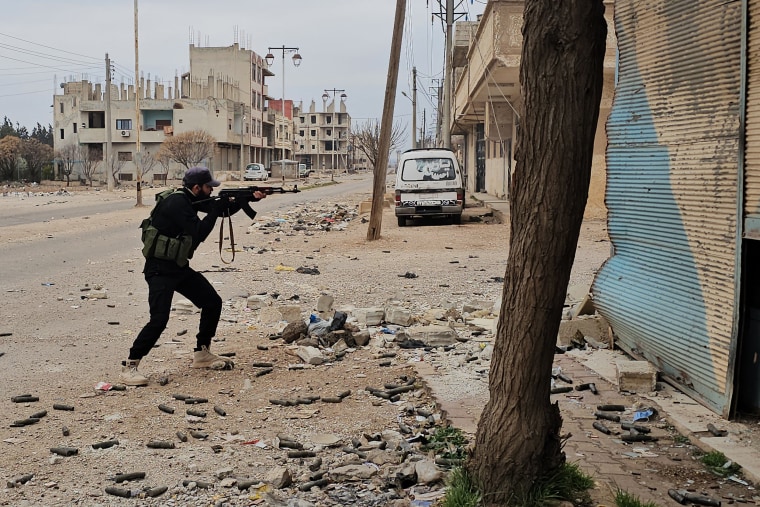Hundreds of civilians have been killed in Syria in the last 48 hours, the deadliest eruption of violence since the fall of the Assad regime in December.
The U.K.-based Syrian Observatory for Human Rights (SOHR) reports that at least 830 civilians have been killed in what it described as “the largest collective act of revenge in the coast and its mountains,” with the death toll expected to rise.
More than 1,300 people have been killed in 72 hours, according to the organization, including security force members and militants.
It is unclear which groups are involved in the killing of civilians, with reports of different militias converging in the area, and much remains unknown about what is unfolding in Syria. Interim Syrian President Ahmed al-Sharaa called for peace Sunday, amid reports of executions, firing squads and bodies piled in the streets.
Clashes between Syrian government forces and fighters loyal to the deposed dictator, Bashar al-Assad, have also led to hundreds more deaths on both sides.
The violence has been concentrated in the coastal areas of Tartus and Latakia, the home of the Alawite community, a small Islamic sect to which the Assad family belongs. According to the SOHR, the vast majority of the civilian dead appear to be Alawites, which NBC News has not independently confirmed.
Secretary of State Marco Rubio blamed “radical Islamic terrorists” for the killings and urged Syria’s leadership to hold them accountable.
Syria’s presidency announced its decision a statement Sunday to form an independent national committee to investigate the events on the Syrian coast, including "causes, circumstances, and conditions" that led to the event. The statement also promised to "identify those responsible."
But as the nation grapples with this surge in violence, here’s what we know about what’s happening on the ground and what it could mean for Syria’s future.
What we know
Syria’s rugged Mediterranean shore was a stronghold of the Assad family’s brutal regime, which lasted 53 years before a rebel alliance led by Hayat Tahrir al-Sham (HTS) ousted Assad three months ago in a lightning-fast offensive that swept across the nation and led HTS leader Sharaa to become the new government’s interim president.
However, Syria’s northwest coast remains a fractured battleground, with armed Assad loyalists holding on to villages and remote pockets of territory.

Sharaa’s government has deployed armed forces to the region in a bid to assert control, but fierce clashes erupted last week that have left hundreds dead.Video posted on social media and verified by NBC News showed dozens of bodies piled on a blood-soaked street in Latakia. Women gathered around the bloodied corpses. One can be heard sobbing, “My dad, my brother, oh, God.”
Other verified videos showed military vehicles moving through the countryside amid explosions and gunfire, while another showed soldiers indiscriminately dropping bombs from a helicopter over Latakia’s rural areas.
The SOHR is a prominent information office dedicated to documenting human rights abuses in Syria.
The group said that the vast majority of people killed in the current clashes were from the Alawite sect and that women and children were executed by firing squad in the countryside near Tartus.
NBC News has not independently verified the death toll or methods of execution.
The Associated Press reported that Sunni gunmen, perhaps loyal to the government, initiated revenge killings Friday, with residents saying that Alawites were being killed in the streets or at the gates of their homes and that their houses were looted and set on fire.
SOHR also reported that 125 government security forces and 148 militants from Assad-affiliated armed groups were among the dead.
Federico Jachetti, Syria country office director for the Norwegian Refugee Council, said in a statement Sunday that the escalation is “a grim reminder that the situation in the country remains fragile” and cited reports of “summary killings, widespread displacement and thousands more left trapped in their homes.”
“Syrian families across the country are yearning for a respite after long years of uncertainty and fear,” he said, calling on all parties to protect civilians.
Who are the Alawites?
The once-ruling minority is a tight-knit Islamic sect to which the Assad family belongs. Under Assad, Alawites were appointed to key positions in the military and security forces, positioning them as the elite within Syria’s state bureaucracy and security apparatus.
The rise of HTS, a former Al Qaeda affiliate with an extremist past, raised deep concerns among the Alawite community as it took power.
Sunni dominance has inflicted deep scars on the region, and minorities like the Alawites, as well as Christians, Druze and Yazidis, all have reasons to fear the rise of extremist governance.
Sharaa had tried to quell such fears, telling CNN in December, “No one has the right to erase another group.”

But the recent surge in violence suggests a different story, challenging Sharaa’s claim that his interim government would protect all groups and foster stability.The U.N. High Commissioner for Human Rights, Volker Türk, urged Syria's leadership to take “swift actions to protect Syrians, including by taking all necessary measures to prevent any violations and abuses.”
What does this mean for Syria?
Unifying Syria’s diverse ethnic and religious groups has been one of the major challenges of a post-Assad Syria. A significant escalation of violence could threaten the country’s fragile stability and at worst threaten to tip the country back into civil war should the interim government lose control of some areas.
Sharaa has actively sought to rebrand himself as a unifier willing to put down his previous extremist affiliations. For a time, this strategy appeared successful, generating a surge of goodwill and optimism.
In February, a video surfaced showing Sharaa waving from the sunroof of a black vehicle, surrounded by a jubilant crowd during his first visit to Latakia, where he appeared receive a hero’s welcome.
Internationally, the explosion of violence may derail the progress Sharaa has made in reassuring Western leaders that he can ferry in a Syria free of threats.